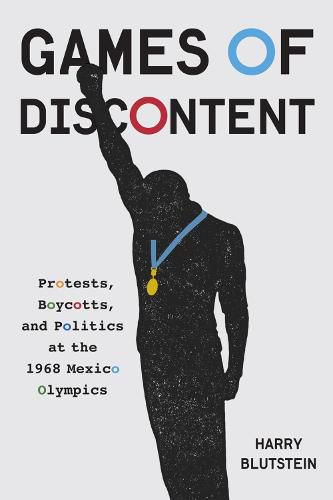Readings Newsletter
Become a Readings Member to make your shopping experience even easier.
Sign in or sign up for free!
You’re not far away from qualifying for FREE standard shipping within Australia
You’ve qualified for FREE standard shipping within Australia
The cart is loading…






This title is printed to order. This book may have been self-published. If so, we cannot guarantee the quality of the content. In the main most books will have gone through the editing process however some may not. We therefore suggest that you be aware of this before ordering this book. If in doubt check either the author or publisher’s details as we are unable to accept any returns unless they are faulty. Please contact us if you have any questions.
The year 1968 was ablaze with passion and mayhem as protests erupted in Paris and Prague, throughout the United States, and in cities on all continents. The Summer Olympic Games in Mexico were to be a moment of respite from chaos. But the image of peace - a white dove - adopted by organizers was an illusion, as was obvious to a record six hundred million people watching worldwide on satellite television. Ten days before the opening ceremony, soldiers slaughtered hundreds of student protesters in the capital.
In Games of Discontent Harry Blutstein presents vivid accounts of threatened boycotts to protest racism in the United States, South Africa, and Rhodesia. He describes demonstrations by Czechoslovak gold medal gymnast Vera Caslavska against the Soviet-led invasion of her country. The most dramatic moment of the Olympic Games was Tommie Smith and John Carlos’s black power salute from the podium. Blutstein furnishes new details behind their protest and examines how this iconic image seared itself into historical memory, inspiring Colin Kaepernick and a new generation of athlete-activists to take a knee against racism decades later.
The 1968 Summer Games became a microcosm of the discord happening around the globe. Describing a range of protest activities preceding and surrounding the 1968 Olympics, Games of Discontent shines light on the world during a politically transformative moment when discontents were able, for the first time, to globalize their protests.
$9.00 standard shipping within Australia
FREE standard shipping within Australia for orders over $100.00
Express & International shipping calculated at checkout
This title is printed to order. This book may have been self-published. If so, we cannot guarantee the quality of the content. In the main most books will have gone through the editing process however some may not. We therefore suggest that you be aware of this before ordering this book. If in doubt check either the author or publisher’s details as we are unable to accept any returns unless they are faulty. Please contact us if you have any questions.
The year 1968 was ablaze with passion and mayhem as protests erupted in Paris and Prague, throughout the United States, and in cities on all continents. The Summer Olympic Games in Mexico were to be a moment of respite from chaos. But the image of peace - a white dove - adopted by organizers was an illusion, as was obvious to a record six hundred million people watching worldwide on satellite television. Ten days before the opening ceremony, soldiers slaughtered hundreds of student protesters in the capital.
In Games of Discontent Harry Blutstein presents vivid accounts of threatened boycotts to protest racism in the United States, South Africa, and Rhodesia. He describes demonstrations by Czechoslovak gold medal gymnast Vera Caslavska against the Soviet-led invasion of her country. The most dramatic moment of the Olympic Games was Tommie Smith and John Carlos’s black power salute from the podium. Blutstein furnishes new details behind their protest and examines how this iconic image seared itself into historical memory, inspiring Colin Kaepernick and a new generation of athlete-activists to take a knee against racism decades later.
The 1968 Summer Games became a microcosm of the discord happening around the globe. Describing a range of protest activities preceding and surrounding the 1968 Olympics, Games of Discontent shines light on the world during a politically transformative moment when discontents were able, for the first time, to globalize their protests.